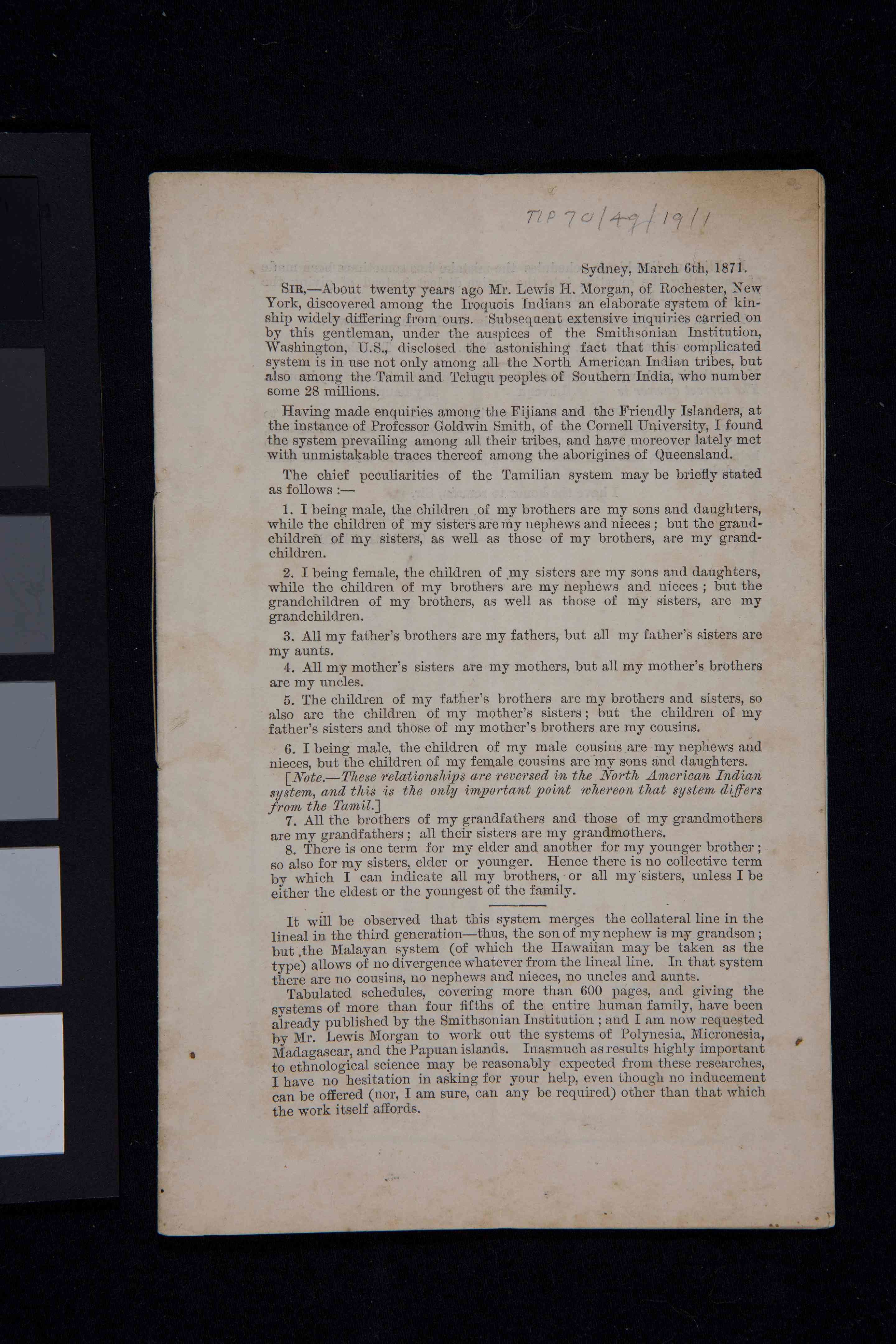Friendly Islands Schedule

Transcription - Page 1
Sydney, March 6th, 1871.
SIR,--About twenty years ago Mr. Lewis H. Morgan, of Rochester, New
York, discovered among the Iroquois Indians an elaborate system of kin-
ship widely differing from ours. Subsequent extensive inquiries carried on
by this gentleman, under the auspices of the Smithsonian Institution,
Washington, U.S., disclosed the astonishing fact that this complicated
system is in use not only among all the North American Indian tribes, but
also among the Tamil and Telugu peoples of Southern India, who number
some 28 millions.
Having made enquiries among the Fijians and the Friendly Islanders, at
the instance of Professor Goldwin Smith, of the Cornell University, I found
the system prevailing among all their tribes, and have moreover lately met
with unmistakable traces thereof among the aborigines of Queensland.
The chief peculiarities of the Tamilian system may be briefly stated
as follows :--
1. I being male, the children of my brothers are my sons and daughters,
while the children of my sisters are my nephews and nieces ; but the grand-
children of my sisters, as well as those of my brothers, are my grand-
children.
2. I being female, the children of my sisters are my sons and daughters,
while the children of my brothers are my nephews and nieces ; but the
grandchildren of my brothers, as well as those of my sisters, are my
grandchildren.
3. All my father's brothers are my fathers, but all my father's sisters are
my aunts.
4. All my mother's sisters are my mothers, but all my mother's brothers
are my uncles.
5. The children of my father's brothers are my brothers and sisters, so
also are the children of my mother's sisters ; but the children of my
father's sisters and those of my mother's brothers are my cousins.
6. I being male, the children of my male cousins are my nephews and
nieces, but the children of my female cousins are my sons and daughters.
[Note.--These relationships are reversed in the North American Indian
system, and this is the only important point whereon that system differs
from the Tamil.
7. All the brothers of my grandfathers are those of my grandmothers
are my grandfathers ; all their sisters are my grandmothers.
8. There is one term for my elder and another for my younger brother ;
so also for my sisters, elder or younger. Hence there is no collective term
by which I can indicate all my brothers, or all my sisters, unless I be
either the eldest or the youngest of the family.
______
It will be observed that this system merges the collateral line in the
lineal in the third generation--thus, the son of my nephew is my grandson ;
but the Malayan system (of which the Hawaiian may be taken as the
type) allows of no divergence whatever from the lineal line. In that system
there are no cousins, no nephews and nieces, no uncles and aunts.
Tabulated schedules, covering more than 600 pages, and giving the
systems of more than four fifths of the entire human family, have been
already published by the Smithsonian Institution ; and I am no requested
by Mr. Lewis Morgan to work out the systems of Polynesia, Micronesia,
Madagascar, and the Papuan islands. Inasmuch as results highly important
to ethnological science may be reasonably expected from these researches,
I have no hesitation in asking for your help, even though no inducement
can be offered (nor, I am sure, can any be required) other than that which
the work itself affords.
Document Details
